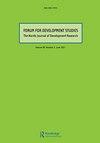Nature as a Subject of Rights? National Discourses on Ecuador’s Constitutional Rights of Nature
IF 1.1
Q3 DEVELOPMENT STUDIES
引用次数: 13
Abstract
Abstract In 2008, Ecuador became the first country in the world to make nature a subject of constitutional rights, and they did so by invoking nature as la Pachamama, the Kichwa Mother Earth deity. This is a biocentric notion which challenges the modernist vision of nature as resources subject to human use, which could imply a fundamental transition in the human-nature relationship with implications far beyond the legal system. With this point of departure, the aim of this article is to explore how Ecuador’s rights of nature are understood and employed rhetorically by relevant actors, particularly in relation to the country’s development model, which is based on extraction and export of natural resources, i.e. a subject understanding of nature. The rights of nature’s meaning have been attempted fixed in a discursive struggle, and three different discourses regarding the rights of nature have been identified from interview data: The Anti-Capitalist Ecologist Discourse, the Transformative Discourse and the Anthropocentric Developmentalist Discourse. The latter, which conceptualizes the rights of nature as anthropocentric sustainable development has become hegemonic. This can explain why the rights of nature can co-exist alongside continued and increased resource extraction with detrimental socio-environmental effects.自然作为权利主体?关于厄瓜多尔宪法自然权利的国家论述
2008年,厄瓜多尔成为世界上第一个将自然作为宪法权利主体的国家,他们将自然称为la Pachamama,即克奇瓦大地母亲之神。这是一个以生物为中心的概念,它挑战了现代主义将自然视为人类利用的资源的观点,这可能意味着人与自然关系的根本转变,其影响远远超出了法律制度。从这个角度出发,本文的目的是探讨厄瓜多尔的自然权利是如何被相关行为者理解和运用的,特别是与该国的发展模式有关,该模式基于自然资源的开采和出口,即对自然的主体理解。在一场话语斗争中,人们试图确定自然权利的意义,并从访谈数据中确定了三种不同的关于自然权利的话语:反资本主义生态学家话语、变革话语和以人类为中心的发展主义话语。后者将自然权利概念化为以人类为中心的可持续发展,已经成为霸权主义。这可以解释为什么自然权利可以与持续和增加的资源开采共存,并产生有害的社会环境影响。
本文章由计算机程序翻译,如有差异,请以英文原文为准。
求助全文
约1分钟内获得全文
求助全文
来源期刊

FORUM FOR DEVELOPMENT STUDIES
DEVELOPMENT STUDIES-
CiteScore
1.80
自引率
14.30%
发文量
24
期刊介绍:
Forum for Development Studies was established in 1974, and soon became the leading Norwegian journal for development research. While this position has been consolidated, Forum has gradually become an international journal, with its main constituency in the Nordic countries. The journal is owned by the Norwegian Institute of International Affairs (NUPI) and the Norwegian Association for Development Research. Forum aims to be a platform for development research broadly defined – including the social sciences, economics, history and law. All articles are double-blind peer-reviewed. In order to maintain the journal as a meeting place for different disciplines, we encourage authors to communicate across disciplinary boundaries. Contributions that limit the use of exclusive terminology and frame the questions explored in ways that are accessible to the whole range of the Journal''s readership will be given priority.
 求助内容:
求助内容: 应助结果提醒方式:
应助结果提醒方式:


